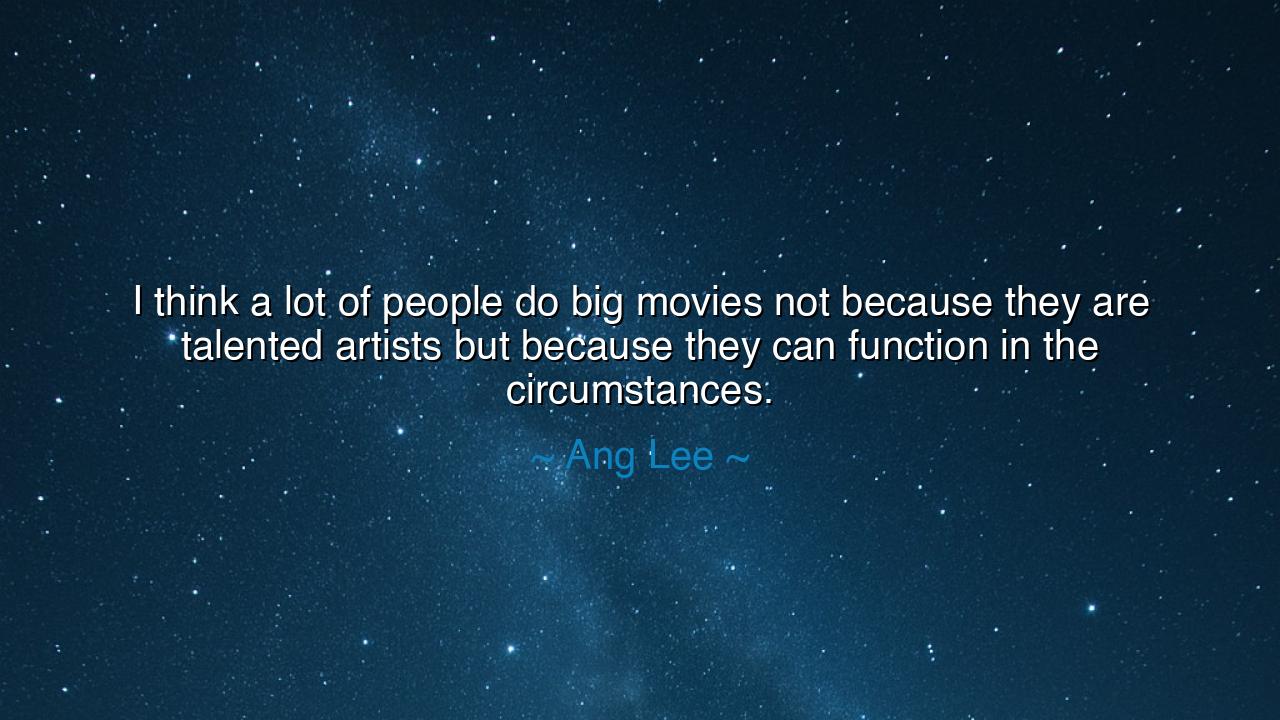
I think a lot of people do big movies not because they are
I think a lot of people do big movies not because they are talented artists but because they can function in the circumstances.






Hear now, O children of the future, the words of Ang Lee, a sage whose insight into the world of art and cinema rings with both caution and wisdom: "I think a lot of people do big movies not because they are talented artists but because they can function in the circumstances." In these words, he speaks not only of the challenges of the artistic world but also of the true nature of creation—one that is often obscured by the demands of commercial success. Lee reveals to us the difference between those who are driven by the calling of art and those who simply have the ability to navigate the vast machinery that makes the modern film industry run.
Consider, O Seekers, the path of the true artist—the one who is not swayed by the tides of popularity or the allure of easy recognition, but whose heart beats in rhythm with the deeper forces of creativity. The great masters of the past—whether they be sculptors like Michelangelo, who carved the David, or writers like Homer, whose epics endure through the ages—did not create out of convenience or circumstance, but out of a deep, unrelenting need to express something authentic and true. To them, the creation was the reward, the process itself a sacred journey. And yet, Lee’s words remind us that in the modern world, where movies are mass-produced for audiences rather than inspired by pure artistic vision, true artistry often becomes diluted in the pursuit of scale and marketability.
The big movies that Lee refers to are not simply a product of art, but a product of circumstance. These films, often created to appeal to the broadest audience, may be polished and filled with spectacle, but they can lack the depth, soul, and purpose that comes with work driven by passion. Consider the tale of William Shakespeare, who, though born into a time of great theatrical tradition, did not create his plays simply to entertain, but to reflect the human condition, to explore the very essence of what it means to be alive. His works, from Hamlet to Macbeth, were not crafted merely to fill the seats of the Globe Theatre, but to challenge the minds and hearts of those who witnessed them. In contrast, the big movies of today often prioritize entertainment over meaning, becoming more about the numbers at the box office than the message they impart.
In Lee's reflection, we see the separation between function and artistry. There are those who can navigate the complexities of a large production, understand the technicalities, and meet the demands of the studio system. These individuals may be skilled craftsmen, but are they true artists? A true artist, like the architects of the ancient world who designed temples to the gods, shapes their work not because it will sell or win acclaim, but because it is an extension of their very soul. Their vision cannot be confined by the limits of commercial success, for their purpose is greater—they seek to illuminate the unseen, to reveal the truths that lie beneath the surface of the world.
Therein lies the lesson for us, O Seekers: that true artistry is not merely about fitting into the system. It is not enough to be able to function in the machinery of the world and churn out works that please the masses. One must ask: What is the purpose behind the work? Why are you creating? This is the question that separates the master from the craftsman, the true artist from the one who simply performs the necessary tasks to create something that is commercially viable. As the great Michelangelo did not see himself as a mere artisan, so must we also view our work as an act of meaning rather than a pursuit of convenience.
In our own lives, whether we are artists, builders, healers, or teachers, we must remember the words of Ang Lee. The world will often try to pull us toward the easy path, the one that offers success without deep sacrifice or purpose. But we must remember that it is not enough to simply function within the system. We must create with intention, with heart, and with the courage to stay true to our vision, even when it goes against the tides of the world. Art—whether in the form of a painting, a film, a poem, or a business—must be born from purpose, not just from the desire to fit in or be accepted.
So let us strive, O children of the future, to walk the path of true artistry. Let us not create for the world’s approval, but for the calling of our own hearts. Let our work resonate with sincerity and meaning, and may we never be content to simply function in the circumstances, but to rise above them, creating something that will endure, that will speak to the soul, and that will transcend the short-sighted demands of the moment. In this way, we will create not merely for the world, but for the ages.






AAdministratorAdministrator
Welcome, honored guests. Please leave a comment, we will respond soon